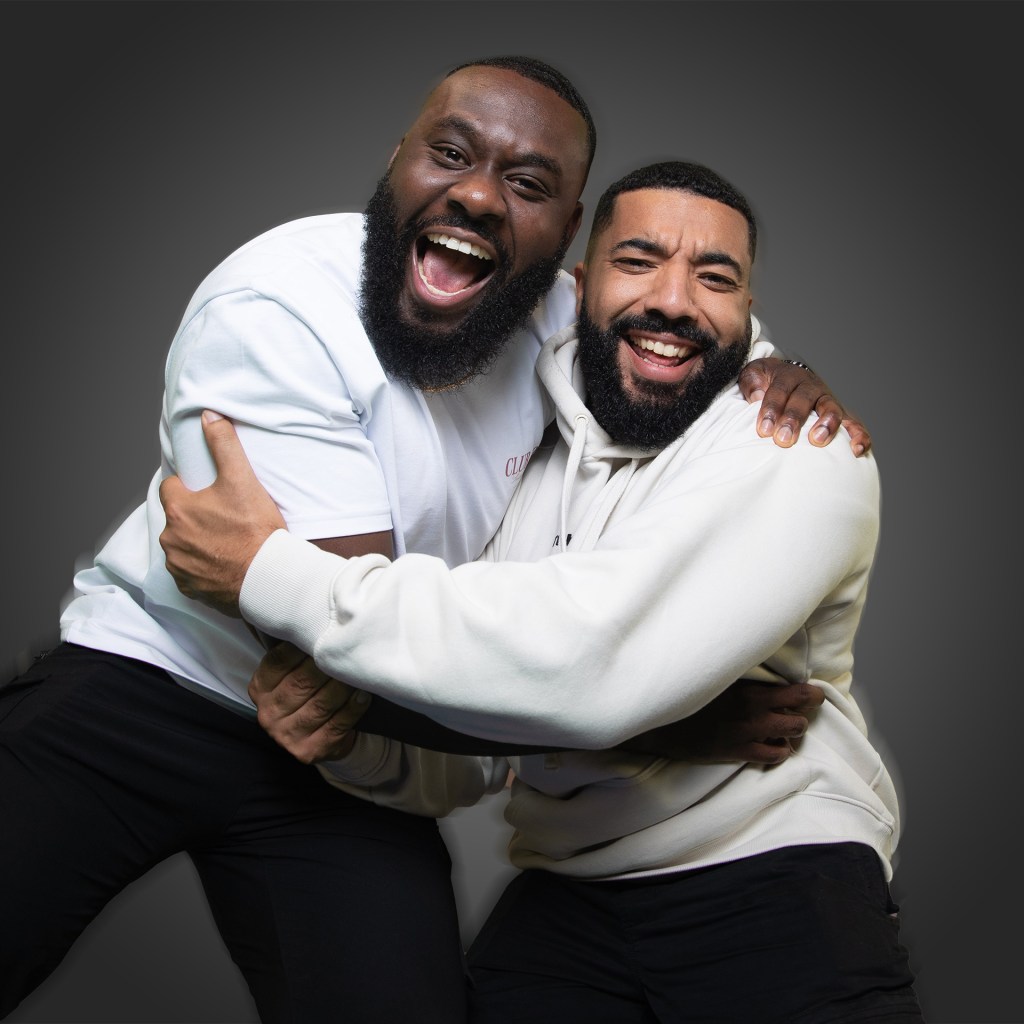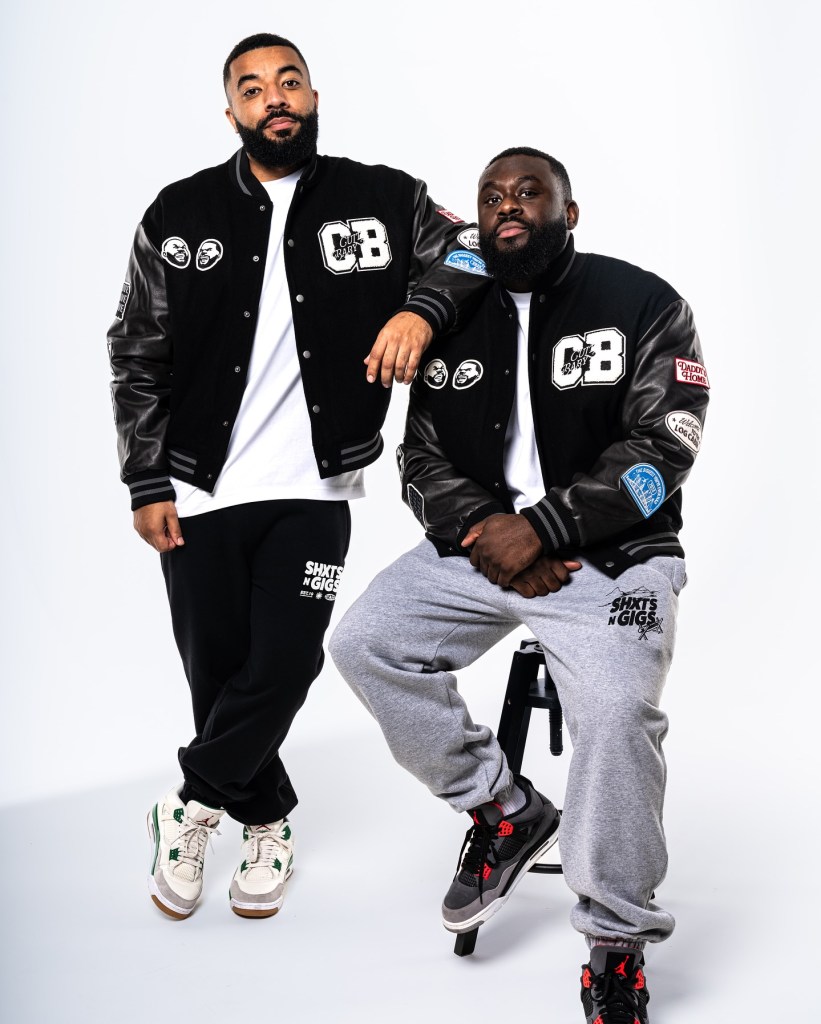
Episode 447 of ShxtsnGigs starts out with the jaunty atmosphere typical of the podcast. Hearty laughs and friendly banter ricochet around the sparsely furnished white room functioning as their studio. But soon after, the conversation takes on a slightly more austere tone. James raises the question of their biggest insecurities, the room quietens, Fuhad, the show’s other co-anchor, shuffles in his seat and moves to answer the question. He declares “not having abs” as his biggest insecurity and the room erupts in laughter. Something interesting happens next. James carefully explains that his laughter was not meant as a put down and that it was merely an expression of surprise. In James’ telling, Fuhad seemed the type to be wholly confident in their body and consequently unbothered by banalities such as a six pack.
James proceeds to unpack his own insecurities. He playfully dances around the subject of his inferiority complex and settles on his “lazy eye” (his right eye is slightly smaller than his left), which then becomes source material for an SNL worthy monologue. As he broaches the subject of his insecurities, James is palpably vulnerable, exposed, but he’s also in the midst of friends and so he’s comfortable with interspersing these moments of openness with comedic flourishes. Ellis (the podcast’s video editor) and Rem (the show’s “researcher”) also share vulnerabilities, weaving in flecks of absurdist humor. A throughline of this intimate conversation is the kindness they show each other. Nothing is deemed too trivial; attention is offered generously; after each reveal, the rest of the group offers reassuring words.
Moments like this, of brotherly camaraderie gussied up in a tenderness typically reserved for female friendships, color the podcast. This quality of the show is so conspicuous that it has spawned an interminable flurry of jokes and conspiracies about the pair—James and Fuhad—being gay. TikTok is awash with hilarious conspiracies of this sort: “James and Fuhad gay”; “James and Fuhad: sus moments (mostly James)”. In a twist of comedic subversion, they have at times playfully leaned into the joke. The poster and promotional photographs for their North American tour this year find them in a series of homoerotic poses: Fuhad bent over with James astride his back like a child straddling a pony; James keeled over with Fuhad resting his elbows on his back; the pair holding each other’s waist, a leg each in the air. For all the amusement their friendship produces, it also begs pertinent questions: Why does every gesture of tenderness within the framework of a straight male friendship need to be annotated with a slovenly “No Homo?” Why do male friendships have to be confined to a stilted series of choreographed interactions? For all the emphasis on mental health in today’s age, why is vulnerability in male circles still a rarity?

Make no mistake, the podcast is by no means effeminate or woke. The show’s hosts are guilty of the disgustingly gauche obsession with dick sizes that typically clouds a lot of male conversations. Homosexuality is a frequent piñata for their joke-addled bonding moments. They are similarly guilty of perpetrating sexist stereotypes. On episode 417, the hosts ask the question “what would you do if there were no women for a day?” To which a respondent replies with “enjoy peace.” Upon reading the reply, they burst into a laughter interspersed with enunciations of “word word.” They also recently came under intense criticism for engaging with racist jokes targeted specifically towards black women. (They have taken responsibility and apologized). However, for all their shortcomings, their podcast stands out as a bastion of positivity in a milieu increasingly dominated by virulent misogyny and racism.

Since Elon Musk assumed the reins of Twitter, which he has since garishly rebranded as X and established as a bubbling cauldron for misogyny, racism, homophobia and far-right politics, it almost feels like social media in its entirety has dimmed several shades darker. Even previously prudish platforms like Meta, in the wake of Twitter’s radicalization, have become increasingly lax with enforcing censorship. This has only accelerated the global shift towards repugnant ideals and the results are conspicuously troubling. In the just concluded US elections young men supported Trump over Harris (56% to 42%). Ambassadors for this renaissance of toxic masculinity—Elon Musk, Donald Trump, Andrew Tate, John D Doe, Wizrab and their ilk—have made a habit of barraging social media with retrogressive rhetoric. In Nigeria, X has become a cesspool where gender-specific bullying, misogyny and homophobia reign supreme. These all point to a shift towards less-progressive ideals.
In the Nigerian context, there’s an absence of concrete data to defend certain positions, such as how far men have drifted on the ideological spectrum. However, online denizens will attest to a shift in attitudes. In contrast to 2016 through to 2019, when men typically assumed feminist attitudes, when issues of male vulnerability were taken seriously, when men were more amenable to sitting at the table with women to discuss a more equitable future, today, the attitude is more regressive, hostile and cynical. There’s a problem with masculinity today, a problem that continues to metastasize with every passing day. And it’s to no small extent due to the endless barrage of regressive content that dominates the media today.
In her seminal article for The Atlantic, In Praise of Heroic Masculinity, writer Caitlin Flanagan deftly bifurcates masculinity into two extremes: toxic masculinity (which needs no further explanation) and heroic masculinity, toxic masculinity’s obverse. As she defines it, heroic masculinity is the force that impelled the 343 New York City firefighters (all of whom were men) who died at Ground Zero on 9/11. In her words “There wasn’t one of them who didn’t know, or at least suspect, that he was climbing to his death. They climbed those towers because they knew that it must be written into American history that the desperate people inside those buildings had never—not once—been abandoned.” She further argues that “If we don’t give these boys examples of strength as a virtue, they will look elsewhere.” Putting heroic masculinity aside, Flanagan’s thesis can and should be extrapolated to the general notions men hold about masculinity. The onslaught of male toxicity that looms over society will not be neutered by cynicism or derogation but by aggressively promoting a positive variant of masculinity.
Over the past few years, progressives have grown increasingly antagonistic towards masculinity. Feminists perennially denounce masculinity, and consequently men, as a scourge. Well-meaning progressive men constantly bend their heads in shame, penitent about their inherent privilege. This dynamic, however well intentioned, has unwittingly created a free range for vile sexists to proselytize their ideas to impressionable young men. There’s a reason otherwise reasonable men gravitate towards men like Trump and Tate: they champion masculinity as something glamorous and admirable in an age when the prevailing attitude toward masculinity is suspicion. If more men were exposed to healthy male friendships, to other men with balanced ideological dispositions, to podcasts like Shxtsngigs where vulnerability and insecurities are treated with seriousness as opposed to being scorned, then perhaps there’s some hope for this generation of men.
